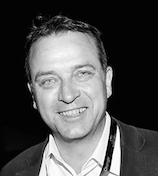The Wall
Every year on December 21st, thousands of ordinary Russians, young and old, gather under the Kremlin walls in Red Square to venerate a long-dead Georgian-born mass murderer.
Dmitry Bogolubov's film The Wall, beautifully shot by Vladimir Kuleshov and colour-corrected to give it the look of a hand-colour sepia photograph, examines the darkness that won't let Russia go. Despite his brutal repression of more than 40 million people, more than 60 years after his death , Stalin remains a venerated figure that many Russians still profess to love.
Russia today is a country that wishes to know nothing of the truth of its past, instead choosing to exalt myths, fictions and fantasies. It is a nation in denial, where mass murder is recast as the 'good old days.' People's connection with even their own family history is so tenuous it barely stretches beyond two generations, as shown by a recent survey by Ogonyok, a respected and long-published weekly news and current affairs magazine=.
For Bogolubov, The Wall is both a metaphor and reality. As devotees of the cult of Stalin stream away from the dictator's tomb in the walls of the Kremlin, the camera holds a static shot that is literally framed by the reddish-brown walls of the ancient seat of Russian power. The Cold War may be long over, the Iron Curtain gone (albeit partially replaced by a cyber curtain), but still a wall remains deep in the psyche of the Russian people.
Bogolubov's film makes nothing explicit in its dialogue-free introduction, ten minutes of hauntingly beautiful, largely static shots. But for anyone familiar with the history of post-war Eastern Europe, The Wall will fire emotional and intellectual reactions, as well as pose questions that its brief 43 minute span will only begin to address.
As one of the undisputed victors of the Second World War, Stalin's brutal suppression of his own people was overlooked in the relief at the defeat of Nazi Germany. Those nations vanquished in the war underwent deep and painful reckonings with their past. To talk to the now ageing children of Nazis or even their grandchildren, in Berlin, Hamburg or Leipzig, is to understand the deep inner work they have done to understand, to find humility and forgiveness. In Russia you will find none of this.
Well, almost. Bogolubov keeps his audience waiting 13 minutes before the tranquil pond of respect for a killer is interrupted by a voice off-camera shouting "Burn in hell, scum!" A young woman then rushes towards the granite bust of Stalin where the faithful have been shuffling forward to lay red carnations, declaring "The blood of the Russian people is on your hands, Judah! Stalin is the enemy of the Russian people!" She is shoved away to the angry cries of the gathered Stalin-worshippers and one young man, probably not even born when the Soviet Union collapsed in 1991, instantly passes a death sentence for her temerity: "Who does not respect Stalin must die!"
The camera returns to a monotonous procession of mourners 60-odd years late for the funeral. Many are supporters of the Communist Party of Russia, sporting KPRF flags or scarves. Early in the film we see the head of the KPRF, Gennady Zuganov, paying his respects. The sepia ranks of Russians pile up the carnations, hold an occasional fist aloft, kiss a photo of their Soviet saint, take photos on their mobiles, light candles and genuflect as if in an Orthodox church.
And yet, this is all the more mesmerising for its lack of a didactic voice. Who are these people? How many of them lost parents or grandparents to Stalin's terror? Do they know? Do they care? What motivates them to venerate a mass murderer? Is it the loss of a country that was once a world power? Nostalgia for an imagined past, a lost future?
Asking them may provide less of an understanding than simply observing, as the occasional slogans and pious utterances some make as they approach Stalin's tomb makes clear. These are sleep-walkers, dead to themselves and dead to history, shuffling forward to the past.
|
|
Nick HoldsworthNick Holdsworth is a writer, journalist and filmmaker with 25 years’ experience of covering Russian and Eastern European affairs. He has served as Moscow correspondent for the (London) Sunday Telegraph, the (London) Times Higher Education Supplement and Eastern Europe correspondent for The Hollywood Reporter and also Variety. He has also produced radio programmes for the BBC and television reports for WTN. |




